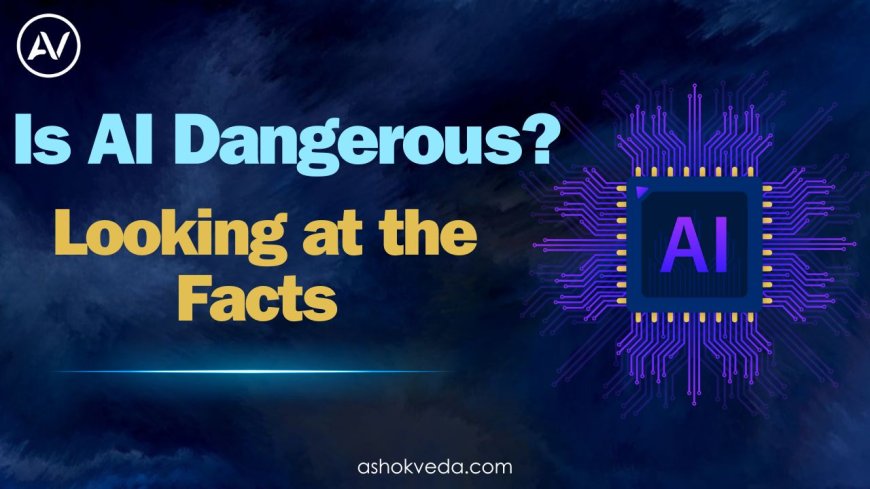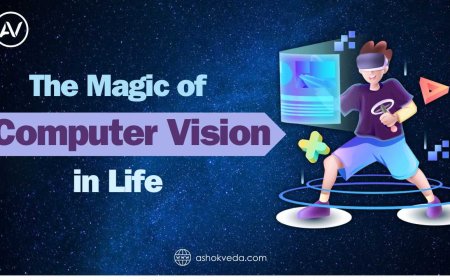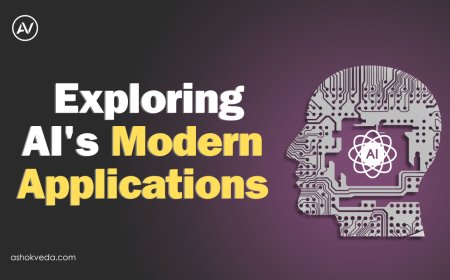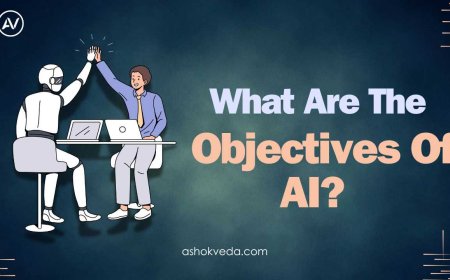Is AI Dangerous? Looking at the Facts
Explore the potential dangers of AI, including data privacy, bias, and ethical concerns. Understand the risks and how to address them.

Hey there, interested minds presently we'll look at a hot topic that's been around for a while: Is AI Dangerous? Whether you've been thinking about it or just came upon it, we're here to look into it together. We'll consider why some question if AI is dangerous, and we'll look at how Artificial Intelligence and other AI tools are influencing the world around us. and come up with an informative study of whether AI is something to avoid or welcome.
What is Artificial Intelligence?
Before we go into the subject of "Is AI Dangerous," Artificial Intelligence (AI) is a model of human intelligence in machines. These machines are intended to think and behave like people, learning from data and improving over time. AI software and applications may do activities such as speech recognition, decision-making, and visual perception that previously needed human intellect.
Why Do People Ask "Is AI Dangerous"?
The question "Is AI Dangerous" often arises from various concerns. Some people worry about the potential for AI to exceed human intelligence, leading to scenarios where machines could control or even harm humans. Others are concerned about job displacement, privacy issues, and the ethical implications of AI.
The Fear of Superintelligent AI
One of the most important reasons people wonder "Is AI Dangerous" is the fear of superintelligent AI. This is the belief that AI could become smarter than humans and behave in ways beyond our control. While this makes for an exciting plot in science fiction films, the reality is somewhat different. The goal of AI development is to create systems that can assist rather than replace humans.
Job Displacement
Another common concern is that AI will take over jobs, leaving many people unemployed. AI automation can indeed perform repetitive tasks more efficiently than humans. However, AI technology also creates new job opportunities. For instance, there's a growing demand for professionals in AI consulting, AI development, and AI services. As AI continues to evolve, it's likely to transform the job market rather than eliminate it.
Privacy and Security Concerns
With the emergence of AI, privacy, and security have become major concerns. AI programs may handle massive volumes of data, raising questions about how it is utilized and secured. However, AI solutions are being developed to improve security. For example, AI can detect cyber threats more effectively than traditional approaches, making our digital environment more secure.
Ethical implications
Another reason people ask "Is AI Dangerous" is because of its ethical implications. Hot concerns include bias in AI algorithms, decision-making openness, and AI businesses' moral responsibilities. Addressing these ethical considerations is important for ensuring that artificial intelligence is used responsibly and fairly.
The Role of AI Companies and AI Platforms
AI companies and AI platforms have a huge impact on the development and application of AI. These organizations are responsible for developing and implementing AI technologies that are safe, ethical, and useful to society. AI firms can reduce the hazards associated with AI by following tight principles and ethical standards.
Practical Applications of AI
AI is used for diagnosing diseases, recommending treatments, and even performing surgeries. AI tools can analyze medical images and detect abnormalities faster and more accurately than humans. While this technology is incredibly beneficial, it also raises questions about accountability and the doctor-patient relationship.
-
Finance
AI is revolutionizing the finance industry by detecting fraudulent transactions, providing investment advice, and automating trading. AI software can analyze market trends and make predictions that help investors make informed decisions. However, the reliance on AI in finance also necessitates robust security measures to prevent misuse.
-
Transportation
Autonomous vehicles are one of the most talked-about applications of AI. These self-driving cars use AI to navigate roads, avoid obstacles, and ensure passenger safety. While the technology promises to reduce accidents caused by human error, it also raises concerns about reliability and safety in unforeseen circumstances.
-
Customer Service
AI chatbots and virtual assistants are becoming common in customer service. These AI applications can handle inquiries, resolve issues, and provide personalized recommendations. While they improve efficiency, there's a concern about the loss of human touch in customer interactions.
AI in Everyday Life
AI is becoming an increasingly important part of our daily lives, often in ways we don't know. From recommendation algorithms on streaming services to smart home devices that remember our preferences, AI is making our lives easier. Although these applications are largely harmless, they raise concerns regarding data privacy and consent.
The Positive Impact of AI
Despite the concerns, AI has the potential to bring about significant positive changes. For instance
-
AI in Education: Personalized learning experiences can be created using AI, catering to the unique needs of each student.
-
AI in Agriculture: AI-driven tools can optimize farming practices, increasing crop yields and reducing resource wastage.
-
AI in Environmental Conservation: AI can monitor wildlife, track climate change, and help develop sustainable practices.
Addressing the Risks
To address the question "Is AI Dangerous," it's essential to consider how we can mitigate the risks associated with AI.
-
Regulation and Oversight Governments and international bodies should establish regulations to oversee the development and deployment of AI. These regulations should focus on ensuring transparency, accountability, and ethical use of AI technologies.
-
Ethical AI Development AI companies should prioritize ethical considerations in their development processes. This includes addressing biases in AI algorithms, ensuring data privacy, and being transparent about AI decision-making processes.
-
Public Awareness and Education Educating the public about AI and its implications can help dispel fears and misconceptions. By understanding how AI works and its potential benefits and risks, people can make informed opinions about the technology.
-
Collaboration Between Stakeholders Collaboration between AI developers, policymakers, industry experts, and the public is crucial for developing balanced and effective AI regulations. This collaboration can ensure that AI is developed in a way that benefits society while minimizing risks.
So, is AI dangerous? The answer isn't just a simple yes or no. Artificial intelligence has a chance to bring about outstanding useful improvements, but it also carries concerns that must be addressed. Benefits of AI while minimizing its risks by focusing on responsible AI development, ethical behaviors, and strong laws.
Incorporating AI technology into many sectors can result in findings and developments that improve how we live. However, it needs to be attentive and address the issues linked to this powerful technology. As we move forward, let us face AI with open minds, but also with caution and responsibility.





































